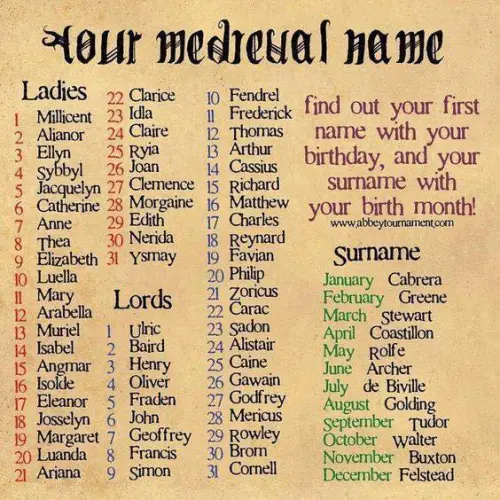There’s a meme (due to www.abbeytournament.com) that’s been circulating around Facebook sporadically recently, allowing people to generate their “medieval name” according to their birthday. You’ve probably seen it:

The first time it came up in a group that a couple DMNES staff are members of — a group not devoted to either the Middle Ages or to names — one editorial assistant put out a cry for “HALP”, and another swooped in with documentation. Now every time that meme comes around, we’re reminded of that thread, and finally decided to make a blog post out of it!
So, how medieval is “Your Medieval Name”? Actually, pretty medieval!
The feminine names are almost all good solid choices for late medieval England or France:
- Milicent – Yes, medieval!
- Alianor – Yes, medieval!
- Ellyn – Yes, medieval!
- Sybbyl – Yes, medieval!
- Jacquelyn – Yes, medieval!
- Catherine – Yes, medieval!
- Elizabeth – Yes, medieval!
- Thea – Possibly medieval but we’ve not found any evidence for it yet.
- Lucilla – Sort of medieval: R.G. Collingwood and R.P. Wright, The Roman Inscriptions of Britain I: Inscriptions on Stone — Epigraphic Indexes (Gloucester: Alan Sutton, 1983), RIB 1288 and 1271, note one Iulia Lucilla in a first- to fourth-century British inscription (in this name, Lucilla appears as a cognomen), and another Romano-British inscription mentioning a woman known only as [L]ucilla.
- Mary – Yes, medieval!
- Arabella – Yes, medieval: E.G. Withycombe, The Oxford Dictionary of English Christian Names, 3rd ed. (Oxford: Oxford University Press, 1988). s.n. Arabel(la) has a 13th C Latin example of the name.
- Muriel – Yes, medieval: A variety of forms can be found in P.H. Reaney & R.M. Wilson, A Dictionary of English Surnames (London: Routledge, 1991).
- Isabel – Yes, medieval!
- Angmar – Um, no.
- Isolde – Yes, medieval!
- Eleanor – Yes, medieval!
- Josselyn – Yes, medieval, but not as a feminine name.
- Margaret – Yes, medieval!
- Luanda – Um, no.
- Ariana – Not medieval: It’s a modern Italian form of the Greek name Ariadne, found in mythology, and in the Greek and Byzantine empires.
- Clarice – Yes, medieval!
- Idla – Possibly medieval. It appears that this googlebook has a Polish example of the name, but we have not been able to get more than a snippet view, to be able to confirm the date and context.
- Claire – Yes, medieval!
- Rya – Um, no.
- Joan – Yes, medieval!
- Clemence – Yes, medieval!
- Morgaine – Yes, medieval, but only used in literature, and not by real people.
- Edith – Yes, medieval!
- Nerida – Definitely not.
- Ysmay – Yes, medieval: Withycombe (op. cit.) has an example of this spelling.
The masculine names don’t fare quite so well.
- Ulric – Yes, medieval!
- Baird – Yes, medieval, but only as a surname, not as a given name. It is derived from Old French baiard or baiard ‘bay-colored’.
- Henry – Yes, medieval!
- Oliver – Yes, medieval
- Fraden – Possibly medieval, but only as a surname, not as a given name.
- John – Yes, medieval!
- Geoffrey – Yes, medieval!
- Francis – Yes, medieval!
- Simon – Yes, medieval!
- Fendel – Not medieval to my knowledge, either as a given name or a surname.
- Frederick – Yes, medieval!
- Thomas – Yes, medieval!
- Arthur – Yes, medieval!
- Cassius – More Roman than medieval.
- Richard – Yes, medieval!
- Matthew – Yes, medieval!
- Charles – Yes, medieval!
- Reynard – Yes, medieval!
- Favian – Sort of medieval, if you take it as a variant of Fabian.
- Philip – Yes, medieval!
- Zoricus – Not medieval to our knowledge, but it could possibly turn up at some point in future research.
- Carac – Not medieval
- Sadon – Not medieval
- Alistair – Medieval, but not as the nominative form of the name, only as the genitive.
- Caine – Yes, medieval, but only as a surname, not as a given name.
- Gawain – Yes, medieval!
- Godfrey – Yes, medieval!
- Mericus – More Roman than medieval.
- Rowley – Yes, medieval, but only as a surname, not as a given name.
- Brom – Yes, medieval, but only as a surname, not as a given name.
- Cornell – Yes, medieval, but only as a surname, not as a given name.
All the surnames are fine for 14th-16th C English, except these:
- Cabrera – This is Spanish, and would only have been used by women; the masculine form is Cabrero.
- Coastillon – Not quite sure what this is but it looks like a misspelling of some French place name.
